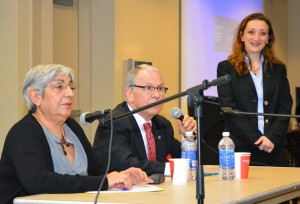- About Ramapo
- Academics
- Admissions & Aid
- Student Life
- Athletics
- Alumni
- Arts & Community
- Quick Links
- Apply
- Visit
- Give
AUTHOR AND LAWYER FETHIYE CETIN SPOKE FRANKLY ABOUT THE CHALLENGES FACING ISLAMIZED ARMENIANS IN TURKEY
(PDF) (DOC) (JPG)December 22, 2015
(MAHWAH, N.J.) — The Center for Holocaust and Genocide Studies of Ramapo College and the Armenian National Committee of NJ co-sponsored a talk by the Turkish-Armenian lawyer and author Fethiye Cetin on “Hidden No More: Challenges Facing Islamized Armenians in Turkey.” The event took place on November 12 at Ramapo College and was attended by more than 100 community members and students. Gross Center Advisory Board member Ani Tchaghlasian introduced Cetin.
Growing up, Fethiye Çetin had no reason to suspect that she had other than Turkish Muslim roots, until one day her maternal grandmother revealed to her that she was by birth an Armenian Christian who had been taken away from her mother on a death march in the course of the Armenian Genocide and adopted by a Turkish military family unable to have children of their own.
This legacy inspired Çetin’s first book, a recounting of her grandmother’s story in the memoir entitled My Grandmother. The book, translated into English by Maureen Freely and published by Verso Books, has become popular worldwide and is recommended reading at several Turkish institutions of higher education. In her role as a lawyer, Çetin has been representing the family of the murdered Turkish-Armenian newspaper editor Hrant Dink.
During her talk, so ably translated by Nurhan Becidyan, a member of the board of the National Association for Armenian Studies & Research (NAASR), she made it abundantly clear that in today’s Turkey, people of Armenian descent whose families were “Islamicized” during the Genocide and are trying to reclaim their heritage face multiple challenges. On the one hand, they may face rejection from their Turkish-Muslim neighbors, police surveillance and exclusion from state employment or. On the other, they may encounter obstacles from Armenian Church authorities when trying to convert to Christianity and a lack of acceptance from the elements of Turkey’s Armenian community, especially in Istanbul.
In these circumstances, according to Cetin, it is not surprising that “Islamicized” Armenians have started to form a sub-culture of their own. In her view, what the current political climate in Turkey holds in store is unclear. The fact that religion is still required to be indicated on state identity cards leaves people open to police harassment or worse. Likewise, without saying so directly, Cetin pointed to dangers emanating from the nationality policies of the current Turkish government that look upon their citizens of non-Turkish ethnicity with extreme distrust.
E-News Archives
| 2023 | 2022 | 2021 | 2019 | 2018 | 2017 | 2016 | 2015 | 2014 | 2013 | 2012 | 2011 | 2010 | 2009 | 2008 | 2007 |Copyright ©2024 Ramapo College Of New Jersey. Statements And Policies. Contact Webmaster.


Follow Us!